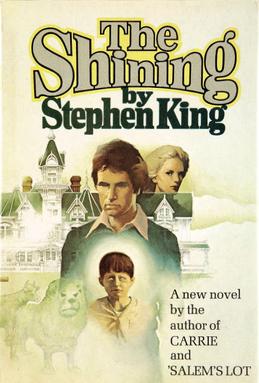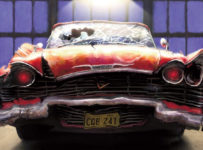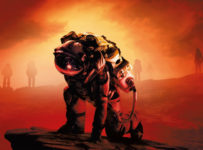
Spoilometer: this write up goes into a fair amount of detail about The Shining. It is not safe if you want to discover the secrets of The Overlook for yourself, because The Shining is one of the more pure delights available on this mortal plane.
The third book in Stephen King's catalogue is The Shining, which is famous for inspiring one of the most iconic films of all time. However, Kubrick's The Shining is the first of many adaptations that King has been disappointed in, to the point that he eventually had to sign an agreement saying that he would stop publicly expressing his distaste for the film.
While The Shining (1980) rightfully has a place in the cinematic canon, The Shining is a novel that we can not (doctor) sleep on. While both Carrie and ‘Salem's Lot had much to recommend them, The Shining is arguably his first masterpiece. Drawing on what we would come to recognise as parts of King's personal, professional, and family life, there are many demons exercised and exorcised between these pages. The Shining is a completely realised work in a way that few novels of any genre are.
Recovering alcoholic, unemployed teacher, and blocked writer Jack Torrance takes a job as winter caretaker at Colorado's Overlook Hotel. Jack's relationship with his wife Wendy and son Danny has been strained for years, but perhaps a season together could be good for them. Unfortunately, the Overlook has other ideas … and Danny's "shine†makes him aware of horrors that no five year old should have to see.
The old saw "x location is an extra character†can legitimately be applied to The Shining: the Overlook is literally a character, a focal point for evil energies that has its own consciousness and will. King looks away from small town evil for the first time, and The Shining features a hyper-focused location almost exclusively. The Shining would be perfect to read on a mountain retreat, snowed in, and on the cusp of murdering your family if they don't take their damn medicine. Lose yourself between the pages instead of listening to the malignant voices of the lodge around you, because The Shining is a book that you inhabit.
This is the reason that King's works so often lack when they get translated to the screen: an intensity of interiority that is difficult to convey without voiceover. The Shining is a tripartite character study, featuring King's first preternaturally intelligent and articulate child protagonist in Danny. The narrative voice employed for Danny is less mature than either Jack or Wendy, but is never irritating. Excepting his psychic power, there is a credibility to Danny's portrayal that speaks volumes to King's deep seated empathy for not just children, but so many of his characters – even the evil ones.
And the Overlook is evil, but Jack himself has the capacity for evil things. The primary thrust of the novel's antagonism is not between Jack and his family, but between Jack and his own baser nature. The tragedy of The Shining is the forces that Jack can't resist, even though he wants to. It's the story of a man who doesn't have to go mad, but he just can't help it. Anyone who's had even casual experience with addiction – either personally, or through someone they know – can empathise, or at least understand. Even when Jack goes too far to ever conceivably recover, he still tries to fight, and this is what makes him a realistic and tragic character – more than just a man who gets cabin fever and tries to kill his family. So often with King it's not about the abnormal scenarios, but the people in them and how they react.Â
That is the true horror of Danny and Wendy's predicament: not that the head of their unit is being sent mad by ghosts, but that the fact of his being sent mad by them seems like it was already in the realm of possibility even if they did not have personal experience of the paranormal. This is a group that is fundamentally dysfunctional, not quite past the point of redemption, but permanently on the cusp of collapse.
Of course, The Shining is a horror novel in the literal sense, not just the metaphorical, and it is good at that. Inspired by King's own stay in a spooky hotel, The Overlook is a sprawling complex with a sordid history and hubristically thrifty management. The Overlook is haunted, not just by spirits, but time itself. The best passages are those that deal with time slipping at the Overlook, the clock striking and the place existing in all times at once. The most iconic line, carried across both novel and film, crackles: "You've always been the caretaker.â€
Many of the scares exist on the periphery of the page: the evil topiary, the party streamers in the elevator, the fire hose (that one is ominous, but still a mystery to this day). When King brings the ghosts to the fore, when we finally see inside Room 217, there is a sense of dread that is physically communicated from the page to the reader. It is a visceral experience for those even with the most literal of minds – here King displays a rare talent for teleportation, and if you're not careful you will fall in. While we spend our lives worried for what Jack might be or what he might become, we know in our souls that the Overlook is fundamentally wrong. To read The Shining is to experience a low level dread until we know that things are going to be okay – if they are going to be okay.Â
Every time the action takes the book away from the Overlook, The Shining exhales. Even for something as brief and simple as a trip to Sidewinder, the town nearest the Overlook, offers the chance of escape; this is the sort of book where even if you know what's coming – and it is quite different to the film in many ways – it is hard not to be ensnared in the sense of dread that King builds. King never takes the easy out and suggests that the Overlook is solely responsible for Jack's rages and eccentricities, and gives him a conflicted childhood and a painfully realised history of alcoholism. King acknowledges that his characters have opportunities to escape, up to a certain point – they just never take them. The Shining often boils down to choice, and the Torrances consistently make the wrong ones because they think they might be best for the cohesion of the unit.
The Shining also contains one of King's more dubious firsts, in Dick Hallorann, King's first "magical negroâ€. Yet Dick, whose fate is quite different to Scatman Crothers' embodiment of the man, is actually fairly benign and does not come across as a racial caricature. He's not the only Shiner in the book, he's helpful to Danny, and he doesn't play into any broader racial stereotypes. King would go on to write far less subtle African American characters, but Hallorann is a welcome presence in the book – a character to stand between the Overlook and the Torrances, and show they don't have to do everything themselves. Overall The Shining doesn't hold anything much that would have been offensive at the time, and it doesn't need to be hand waved away forty-one years later. That will sadly not be the case with some of the other work in the King back catalogue.
If Stephen King had stopped with The Shining, we would undoubtedly be more culturally deficient, but we would still have quintessential examples of teenage revenge tragedy, vampire, and haunted mansion novels. That he kept on going was a boon to us all, but these first three are massive achievements in themselves.



No Responses